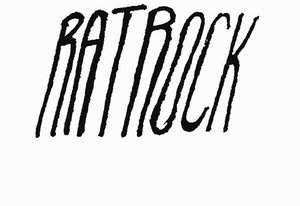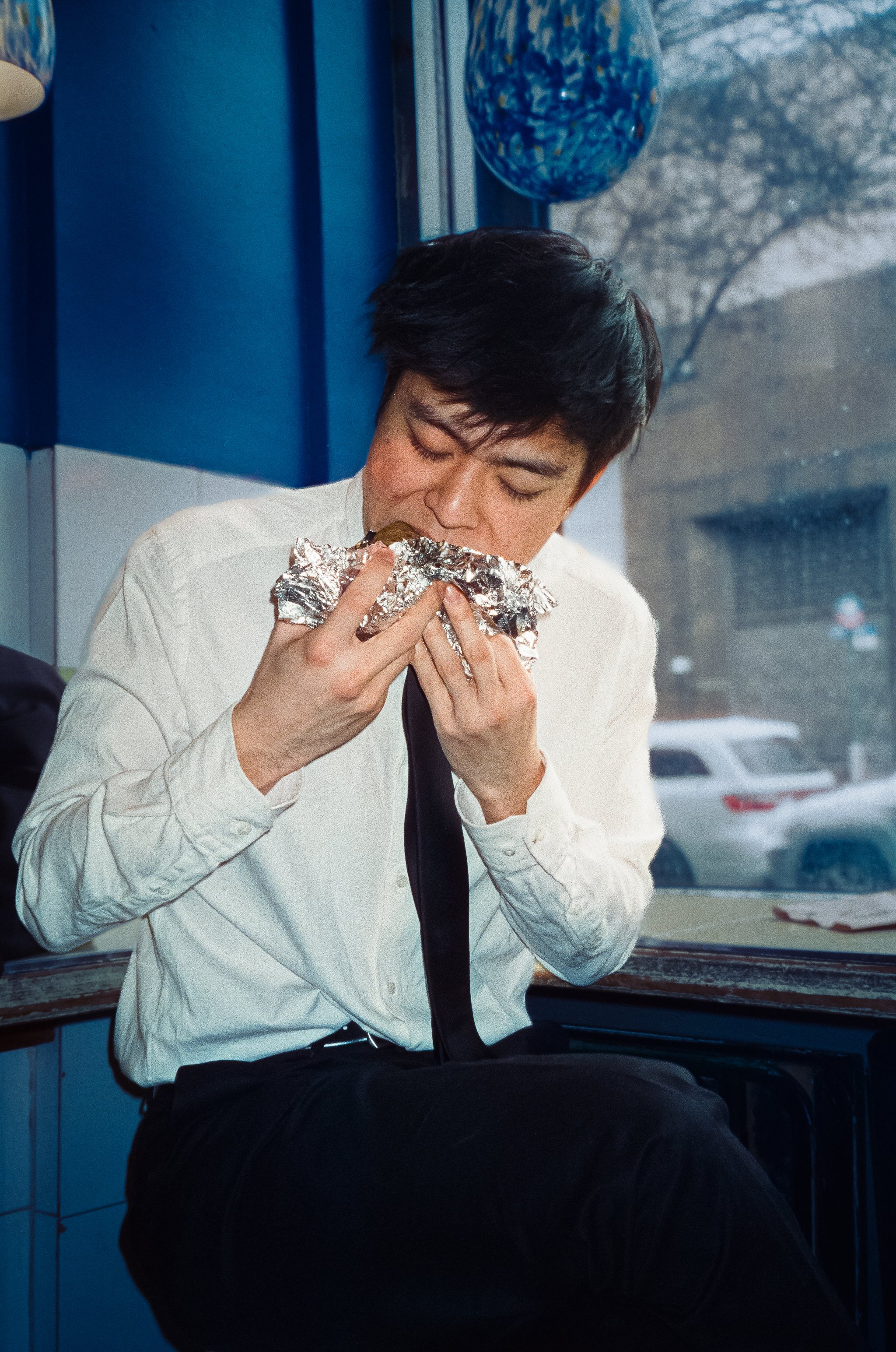Feature by Mara Toma
Photos by Anaïs Mitelberg
Renny Gong (he/him) has a very pleasant smile, takes many pauses in conversation, and his preferred beverage at the Hungarian Pastry Shop is black coffee. He prefers black coffee not because he is particularly fond of Hungarian’s black coffee but because he is able to refill his beverage as much as he pleases [pro-tip: order black coffee if you don’t want to keep paying for those fluffy cappuccinos]. Due to popular demand, I never got a chance to taste the stew he sold in Lerner, but something tells me that he would put a lot of joy into any culinary endeavor he undertakes. If in luck, you might be able to hear Renny singing a Justin Bieber hit over karaoke (perhaps at a certain poetry open mic night). I was minutes or maybe even seconds away from witnessing both Renny’s cooking and singing… I hope I’ll get to eat his food and hear his singing one day. Renny describes himself as a flash-fiction writer.
Mara Toma– What’s one thing that made you feel something today?
Renny Gong – I wanted to show you something. Look at this! I have a carabiner attached to my pants and there are a bunch of keys on it. When I stand up, it (really) jangles [Renny gets up at this point]. I put it on for the last few days, and today in particular… I knew I wanted to show Mara [you].
MT— Is that specific to today?
RG— It’s specific to the last few days because I rediscovered it in my possessions. I forgot about it a little bit but now it is fully part of my aesthetics. My friend Andy (one of my best friends), a very sweet guy, decided to get me this as a birthday present. Interestingly, these keys don’t do anything… they're simply decor. Isn’t that so funny?
MT— It is. And there is an interesting musicality too, you now.
RG— It’s a very annoying musicality. I walk around and I clang clang everywhere. He [Andy] went into a key store and asked if he could have their spare keys, and picked all the ones that looked weird.
MT— Now that I am getting to know you a bit more… If you had a day to yourself and you could do anything you wanted to, how would you spend it?
RG— I’d go to the Hungarian Pastry Shop– I honestly feel at my best there. One thing that I love about the Hungarian Pastry Shop is that it’s very loud and there’s no music, and one feels very consumed by noise. There is also nothing piercing through the noise so you can feel fully bothered… which I enjoy. I'd also like to play a game– it can be Gomoku or this other game called Sheng Ji. Sheng Ji is a Chinese card game played by 4 or more players… It's my favorite game in the world. Hungarian Pastry Shop, play a game, black coffee, and I’d like to be on some sort of transportation vehicle, but not a car. I want to be on a train or a bus. I’d like to go somewhere and come back. I would also call my mom.
MT— I am curious… What attracts you to transportation?
RG—I feel like I’ve done something once I’ve transported. If I am just around I don’t feel as good as when I’ve left. You know how some people say things like “I’ve got to get out of the city, or I've got to get out of Morningside Heights, or I've got to get off campus”... I feel that constantly.
MT— Shifting gears a little bit. I feel like your work may be interpreted in a number of ways. It could be read as poetry, prose, or even song sometimes– especially in your shorter pieces, your writing’s identity can appear fluid. Do you defy classification?
RG — I don’t want people to think I am a poet… I don’t know why. There is nothing wrong with a person who writes poems; poems are really good, and poets are nice. I don’t know that I want to be a poet because I’ve set out to become a fiction writer.
MT— As a writer, what does your creative process look like?
RG– Do you make art?
MT– I am not an artist, but I doodle.
RG— What is your creative process for doodling?
MT— I feel bored and then I doodle.
RG— It’s the same thing then– I feel bored and I doodle. I am always trying to think about someone’s voice. If the first line sounds good, then it will work. At least initially, it’s about how it sounds. If it sounds good at first then it will carry throughout the piece. Most artistic process is coming up with a nice first sentence. Also, writing has to sound like someone’s speaking.
MT– How do you construct that voice, that someone-speaking effect?
RG— I say it out loud. If it sounds like someone, it’s good.
MT– Something else that struck me about your work is that it seems to be rooted within a very specific moment in time. It almost feels like a photograph that immortalizes a very specific experience, feeling, or event. What’s the role of temporality in your writing?
RG — My work tends to get very into one moment. I don’t want to make any generalizations. It’s a difficult task to make generalizations about the world. Statements like “that’s why you should never get into a car with a stranger” or “hurt people hurt people” are bad things to write. Instead, the way to achieve some sort of greater meaning is to dig deeper into a specific meaning. That way, you can illuminate deep into one moment, and that can actually help you understand something.
MT — In addition to dealing with a very specific moment in time, a lot of your work engages two parallel interior and exterior worlds that are constantly interacting with one another.
RG— The two are always interacting with one another. I write more “exterior,” though… I want to let the reader figure out the interior. It’s harder to purely write the interior without the exterior. You can say something like “I felt sad” which is not interesting. Instead, you can describe the outcomes of sadness and that way the thing itself is much more sad… and you feel more from that. If I say “I felt sad,” you don’t actually empathize with me. But if I say I did something dramatic and I’ll tell you what the dramatic thing was then you’ll empathize with me. It’s more valuable to write about the exterior as a way to illuminate the interior.
MT — What strikes me is that even though you are firm in the fact that you are a fiction writer, your work is written exclusively in first person and is filled with many details that read as autobiographical. How does your identity interact with the work?
RG — All fiction is completely autobiographical– there is no escaping autobiography. If you make up a story, the elements of that story are still you. There is no point of distinction… everything is me and everything is you. If I incorporate non-fiction elements in my writing that doesn’t make it less fiction. And all storytelling, even "nonfiction" storytelling, is an act of lying. You are always choosing what to share and not share… The prose doesn’t suddenly become better or worse if it’s fiction or nonfiction. It’s not very enjoyable to draw the line between fiction and non-fiction. If you decide that it’s better or worse because it’s fiction or nonfiction, then you are not paying attention to the right things. If you say it’s one thing or another, that’s not interesting. For instance, if you ask your crush if they are into you, and they say “yes” or “no” then the crush is over.
MT– For some people it’s the beginning of a burgeoning relationship though.
RG– Yes it’s true, but the crush is over. Or, the infatuation or the crush may not be over, but something is over.
MT– The mystery is over maybe? The delusion?
RG– Yes, the delusion is over. And delusion is engaging…
MT- When reading your work I felt an informality about it that felt joyful and freeing. How would you characterize the role of joy in your work?
RG—[Instead of answering my question, Renny told me 7 facts about animal sex. According to him, that was more interesting and I think I agree.]
MT– When reading your work, I felt that your writing sometimes resists endings. Would you say this is true?
RG— My dad says it does. But no, I don’t resist endings. I think about endings very carefully, how to land them, where to land, in what fashion to land. I think all my stuff has carefully considered endings.
MT–... I don’t think your endings are not carefully considered– I just think some of your prose resists that finite end.
Columbia professor Sam Lipsyte, who I am doing an independent study with this semester, says that an ending should look like this
[At this point, Renny takes out a notebook and draws two circles. For the first circle, he connects the beginning point with the end point, “a full circle” whereas for the second circle he draws a circle but instead of connecting the beginning to the end the line isn’t fully connected.
A short story should end like this [points to the second circle] so that it achieves an almost closure. That’s something I think about for endings.
MT– Finally, you mentioned working on a novel. Could you tell me a little bit about that?
It’s about a bunch of kids playing ping-pong in rural China. A bunch of wacky shit happens… The kids have some issues. One of the kids, for instance, is twelve years old and has an alcohol problem. His name is Jean-Pierre. There’s a guy named Durian [who is the other main character, I would say]. He loves karaoke. There’s a guy who draws porn for money. They all get really mistreated by the coaches. And there’s a lot of rule-explaining–telling how ping-pong works.
But mainly, it’s a story about the main character and his mother.
MT– … inspired by autobiography?
RG– 10% of it. The setting is all autobiography, but all the content is not.
MT— do you play ping pong?
RG— yeah. That’s the main history of my life: table tennis. I’ve pivoted into the second phase of my life: writing. The first phase is called table tennis and the second phase is writing.
You can find more of Renny’s work here: www.rennygong.com



































